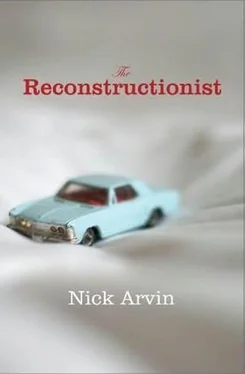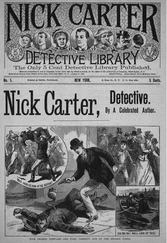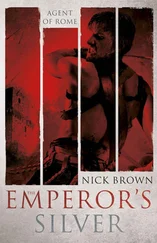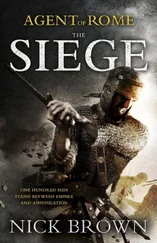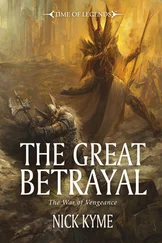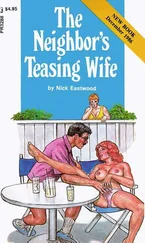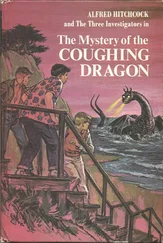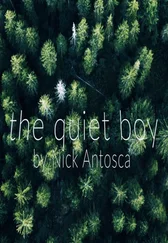‘Don’t you think,’ Boggs said, ‘that if you weren’t in love with my wife, you could come up with something a little more compelling to say? There must be a part of you that would be happy to see me gone. Maybe only subconscious. Your brain throws up some ideas, not others. What are the constraints on their formation?’
‘You’re trying to guilt-trip me.’
‘Yes.’ Boggs stood, and he seemed to tower in the new light. ‘Let’s go.’
‘Leave him?’
‘Yes.’
‘We can’t do that.’
‘Actually, we can.’
The body’s flesh was bone pale. The skin of the neck held two creases, an imprint of years of life.
‘You’re welcome to stay,’ Boggs added.
One of the body’s hands still extended to the lake, and the waves teased the fingers like a cat.
‘How can we leave him?’
‘We don’t know anything about him. Later we’ll probably wonder if he even really existed.’
Ellis didn’t know which was more terrible, that he didn’t know anything about the man, or that this meant that he might leave him. But Boggs started away and Ellis moved in his trail.
The world appeared to unsettle and shift as if composed of tiny swarming insects, and although he followed as best as he could, his foot caught in a hole, he fell and he lost sight of Boggs. When he reached the road Boggs had gone, and even the road lay empty. He clambered into the minivan and accelerated, tyres scrambling.
He drove south a mile, then turned onto a divided highway with entry and exit ramps and a grass median – it was a state highway, but looked like an interstate. He stopped below the windmills. Boggs was not to be seen. Ellis stood out of the minivan, but after a minute he climbed back inside. He felt at a loss. He doubted whether he had the energy to pursue Boggs further, and he didn’t know what he should have said to him, but felt that he hadn’t said it. Perhaps Boggs was right about his subconscious. Perhaps he really only wanted Boggs’s spontaneous and unjustified forgiveness.
Eventually he stood out again and with aimless impatience he walked a little distance uphill. Wind ghosted the grasses. To his right grew a patch of waist-high milkweed and moving across the weeds were the long-limbed shadows of a turning windmill, shadows that came toward him and passed over him, and he had to fend off a sudden vertigo, and turned to the traffic below, coruscating in the sun. The accident had occurred in a fog bank and involved three semis, five cars, two SUVs, a minivan and a pickup towing a pontoon boat. Witnesses described an aftermath of smashed and overturned vehicles haphazard on the road, two of them burning, the pontoon boat on its side, injured people wandering and shouting, the sirens and lights of police, fire and ambulance vehicles drifting in the fog, and the bodies of dead pigs – one of the semis had been pulling a trailerload of hogs – scattered over asphalt and into ditches and fields, and all of this overlaid with the awful screams of uncomprehending, writhing wounded pigs, and the occasional report of a police pistol silencing one.
But what Ellis recalled vividly was that when he and Boggs came here to conduct their scene inspection a year later, a stray black-and-brown mutt with white in the muzzle had sat a short distance away from them and barked mournfully while Boggs had left the rental running, announcing Tolstoy’s ‘Master and Man’ through open windows, the sound of certain words floating in the air like wallowing balloons, ‘ … cob… sledge… drift… ravine… mittens… ’, while the two of them worked up and down the road, dodging in and out of traffic. No sign of the pigs remained, but there were long dark stripes where the vehicles’ tyres had skidded and yawed, and a series of indentations on a guard rail where one of the semis had bumped and slid. They documented everything with cameras and surveying equipment, sweating and shouting to each other down the open distance of the roadway and over the roar of passing trucks. For most of the afternoon the black-and-brown mutt sat scratching itself and contemplating them from the edge of the ditch, occasionally sniffing and doddering around, and then this one, too, came to their specially outfitted hard-sided equipment case and lifted a leg. Boggs looked at the dog, looked at Ellis, then shrugged, yelled, threw a measuring tape and chased the dog down the road shoulder, arms upraised, yipping, shrieking. He had appeared absolutely happy.
And now on the opposite side of the highway Boggs’s green convertible slowed and parked.
Boggs stood out gripping a white paper bag, and without hesitation he stepped into the lanes – a car swerved violently around him, honking. Others braked hard.
Ellis shouted and started down the hill toward him.
Boggs walked across the lanes and into the median, while traffic beside him came to a standstill, a chorus of horns blaring. He moved into the other set of lanes the same way, but there happened to be a gap in traffic and the effect was less dramatic. As Ellis came up, Boggs frowned at the minivan. He said, ‘Don’t they make some kind of a man’s version of that?’
‘Boggs -’ Ellis said.
‘I brought doughnuts.’ Boggs held out the white paper bag. Ellis pushed it away. Scenting the sweetness, he felt sick.
Boggs began up the hill, and after a second Ellis followed. Now and again he stopped to gasp and to yank burrs from the cuffs of his slacks. He caught up with Boggs at the base of a cyclone fence that surrounded the windmills, and they sat. The windmills swished and squeaked faintly, and the noise of the highway rose in a susurration. In the distance they could see the other hill and the Texaco sign about additives and the road that curved at its foot and the lake where the dead man lay. With the sun behind them, the lake waters appeared black. It was part of a chain of lakes stretching out behind a reservoir in the far distance. Nearer, a hawk floated round on a thermal.
‘In the fog, you couldn’t have seen anything from here,’ Boggs said. ‘All there would have been were pig screams and shots.’ A semi, entering the fog, had slowed. A second semi, following the first, had not slowed as quickly as the first and hit it. Other vehicles coming into the fog piled up behind. A man in a pickup had survived a collision with an SUV and climbed out and, as he stood in the roadway, a semi ran him over. To explain how he ended up where he did – seventy feet down the roadway – was tricky, and Ellis and Boggs had concluded that a flange in the undercarriage of the semi had dragged him along until the semi jackknifed and overturned. It was the same semi that had hauled the doomed swine.
‘What are you going to do?’ Ellis asked.
‘I’m thinking maybe a little hut near a beach in California, maybe sell juice and smoothies to girls in bikinis, and I’ll have a small apartment upstairs, and I’ll learn to surf.’
‘Are you serious?’
Boggs grinned and shrugged. ‘I’d like to see these windmills at sunset. Something about windmills has always reminded me of the end of things. Sunsets and windmills and Ragnarok. Nothing so large should be moving like that. It’s as if we’re trying to engineer the world into a freakish final image before we destroy ourselves.’
‘Yeah. I’m tired, Boggs. Are you going to kill yourself or not?’
‘I like you, Ellis, but I wish you had more sense. I like your melancholy air, your talent for writing a technical report and your skill at calculating crush energy, but you’re kind of an asshole, too.’
‘Talk to me about your decision process.’
‘Jesus,’ Boggs said. ‘There’s no process. I’m devoid of process.’
‘No process. OK. You’re just doing nothing.’
Читать дальше
